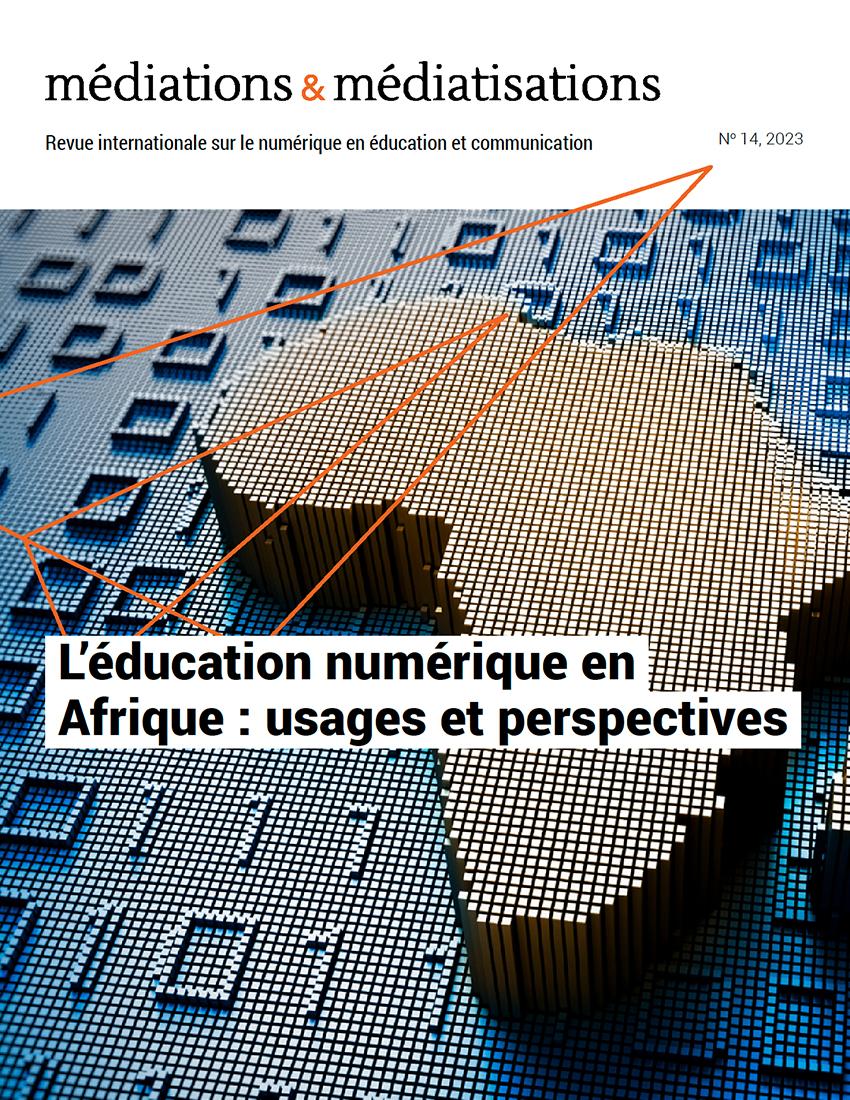La technologie des registres distribués (TRD) : usages et perspectives dans le secteur de l’éducation
Contenu principal de l'article
Résumé
La technologie des registres distribués (TRD), connue aussi sous le nom anglais de « Distributed Ledger Technology (DLT) » ou « blockchain », constitue une innovation stimulante et aujourd’hui très présente dans le monde des affaires et de la finance. Selon CPA Canada (2019), ces technologies sont puissantes au regard de leur potentiel de création de nouveaux modèles économiques. De nombreux pays ont déjà adopté la TRD pour certains aspects liés à la légalisation des documents, à l'identité, à la résidence électronique, à la santé, à la sécurité et à d'autres services administratifs. Avec l’arrivée du numérique dans le monde de l’éducation par le biais de l'apprentissage à distance, les classes intelligentes et les outils de gestion scolaire intelligents, la technologie a pris place dans les écoles et risque d’en définir en grande partie les évolutions futures. L’arrivée des registres distribués s’inscrit dans cette lignée. Cependant, l’évolution rapide et constante et la complexité de la technologie des registres distribués, la rareté des compétences spécialisées en TRD en Afrique, le coût important de l’infrastructure initiale ainsi que l’absence du cadre réglementaire soulèvent des interrogations et des inquiétudes quant à l’adoption de cette technologie dans un secteur aussi sensible que l’éducation.
Téléchargements
Renseignements sur l'article
Références
Alammary, A., Alhazmi, S., Almasri, M. et Gillani, S. (2019). Blockchain-based applications in education: A systematic review. Applied Sciences, 9(12). https://doi.org/10.3390/app9122400
Arndt, T., et Guercio, A. (2020). Blockchain-based transcripts for mobile higher-education. International Journal of Information and Education Technology, 10(2), 84-89. https://doi.org/10.18178/ijiet.2020.10.2.1344
Bajo, D. (2021, 27 juin). Integrating BlockchainTechnology in Africa: Far-Fetched or Feasible? Academike. https://www.lawctopus.com/academike/blockchain-technology-in-africa/
Banda, M. (2021). African enterprises warm up to Blockchain technology. Intelligent CIO. https://www.intelligentcio.com/africa/2021/07/22/african-enterprises-warm-up-to-blockchain-technology
Bhaskar, P., Tiwari, C.K. and Joshi, A. (2021). Blockchain in education management: present and future applications, Interactive Technology and Smart Education, 18(1), 1-17. https://doi.org/10.1108/ITSE-07-2020-0102
Bidarra, J. et Mamede, H. (2019). Artificial Intelligence & Blockchain in Online Education. Dans The Envisioning Report for Empowering Universities, 3e édition (p. 27-29). EADTU. https://tinyurl.com/bde6zduj
Blockchain Ireland (2022). Africa Blockchain Report 2022 – Accelerating Blockchain Innovation across the continent. https://tinyurl.com/25h49svm
Buckler, N. (2022). Web3 Education: Traditional Learning Disrupted by Metaverse Schools. BeInCrypto. https://beincrypto.com/web3-education-traditional-learning-disrupted-by-metaverse-schools/
Burke, C. (2022, 3 février). Strengthening Digital Services with Blockchain Technology in Africa. Busiweek. https://www.busiweek.com/strengthening-digital-services-with-blockchain-technology-in-africa/
Choi, M., Kiran, S. R., Oh, S.-C., et Kwon, O.-Y. (2019). Blockchain-based badge award with existence proof. Applied Sciences Journal, 9(12). https://doi.org/10.3390/app9122473
CPA Canada (2019). Technologie des registres distribués / chaîne de blocs : Perspectives. CPA Canada et Université de Toronto. https://tinyurl.com/4hxjn87t
De Bem Machado, A., Sousa, M.-J. et Dos Santos Pereira, F. (2019). Applications of Blockchain technology to education Policy. WSEAS Transactions on Information Science and Applications. 16, 157-163. https://www.wseas.com/journals/articles.php?id=1827
DeepTech (2020, 5 nov.). Education is the key to Africa’s Blockchain future. Sigma. https://sigma.world/news/education-is-the-key-to-africas-blockchain-future/
Digital Times (2021). Leveraging Blockchain To Create Learning And Employment Pathways For African Youth. Digital Times. https://tinyurl.com/2p8s7vk7
Élongué, C. (2019). Usages de la technologie Blockchain en Afrique. Ces pays africains qui expérimentent déjà la chaine de blocs dans certains projets éducatifs. Thot Cursus. https://cursus.edu/fr/12534/usages-de-la-technologie-blockchain-en-afrique
Francisco, J (2020). How Blockchain Technology Will Transform Africa’s Education Sector. Business Blockhain HQ. https://tinyurl.com/y4mtjhb6
Giuliani, D. (2018). Blockchain in Africa: Assessing opportunities and feasibility. Briter Bridges. https://briterbridges.com/blockchain-in-africa-assessing-opportunities-and-feasibility
Hugo, S. (2022). University of Johannesburg first in South Africa to issue Blockchain-based certifications. Luno. https://discover.luno.com/university-of-johannesburg-first-in-south-africa-to-issue-blockchain-based-certifications/
Hyrynsalmi S., Hyrynsalmi S. M., Kimppa K. K. (2020). Blockchain Ethics: A Systematic Literature Review of Blockchain Research. Dans Well-Being in the Information Society. Fruits of Respect. WIS 2020. Communications in Computer and Information Science, vol. 1270. Springer, Cham. https://doi.org/10.1007/978-3-030-57847-3_10
IBM (2017). Building trust in government. Exploring the potential of Blockchains. IBM Institute for Business Value. Survey conducted by The Economist Intelligence Unit. https://www.ibm.com/downloads/cas/WJNPLNGZ
Lajeune, G. (2022). Qu’est-ce qu’une attaque des 51 %? Futura. https://www.futura-sciences.com/tech/questions-reponses/cryptomonnaie-quest-ce-quune-attaque-51-16035/
McGreal, R. (2021, 19 janvier). How Blockchain could help the world meet the UN’s global goals in higher education. The Conversation. https://tinyurl.com/2p9yazyb
McQuinn, A. et Castro, D. (2019, avril). A Policymaker’s Guide to Blockchain. Information Technology & Innovation Foundation. https://itif.org/publications/2019/04/30/policymakers-guide-blockchain/
Mikroyannidis, A. (2021, 6 oct.). Leveraging Blockchain for OpenSTEM Africa. alexmikro.net. https://alexmikro.net/leveraging-blockchain-for-openstem-africa/
Ministry of Information, Communications and Technology. (2019, juillet). Emerging Digital Technologies for Kenya. Exploration & analysis. https://www.ict.go.ke/blockchain.pdf
NEPAD (2021, 17 février). Redefining Africa’s Digital Economy Through Blockchain and Cryptocurrency Technologies. Blogue. https://tinyurl.com/ywccwwnk
Ojo, A. et Millard, J. (2017). Government 3.0 – Next Generation Government Technology Infrastructure and Services: Roadmaps, Enabling Technologies & Challenges. Springer.
Pal, O., Alam, B., Thakur, V., et Singh, S. (2021). Key management for Blockchain technology. ICT Express, 7(1), 76-80. https://doi.org/10.1016/j.icte.2019.08.002
Palmisano, T., Convertini, V., Sarcinella, L., Gabriele, L. et Bonifazi, M. (2022). Notarization and Anti-Plagiarism: A New Blockchain Approach. Applied Sciences., 12(1), 243. https://doi.org/10.3390/app12010243
Parkin, D. (2021, 27 avril). Ethiopia overhauls its education system with IOHK Blockchain partnership. City A.M. https://www.cityam.com/ethiopia-overhauls-its-education-system-with-iohk-blockchain-partnership/
Qandoussi, M. et Houssaini, A. (2022). Santé, supply chain pharmaceutique et blockchain : un Aperçu. African Scientific Journal, 3(13). https://www.africanscientificjournal.com/index.php/AfricanScientificJournal/article/download/224/228
Raimundo, R., et Rosário, A. (2021). Blockchain System in the Higher Education. European Journal of Investigation in Health, Psychology and Education, 11(1). https://doi.org/10.3390/ejihpe11010021
Reis-Marques, C., Figueiredo, R., et de Castro Neto, M. (2021). Applications of Blockchain Technology to Higher Education Arena: A Bibliometric Analysis. European Journal of Investigation in Health, Psychology and Education,
(4). https://doi.org/10.3390/ejihpe11040101
Romund, G. (2017). Understanding Review Types: Scoping Reviews. University of Manitoba - Libraries. https://libguides.lib.umanitoba.ca/reviewtypes/scoping
Salau, A. (2019, 13 décembre). Preparing African Educational Systems for Blockchain Technology. Premium Times. Opinion. https://tinyurl.com/5n6py7n7
Sawahel, W. (2018, 12 octobre). Universities should address demand for Blockchain skills. University World News. https://www.universityworldnews.com/post.php?story=20181010064727399
Tapscott, D. et Kaplan, A. (2019, 22 avril). Blockchain revolution in education and lifelong learning: Preparing for disruption, leading the transformation. Blockchain Research Institute and IBM Institute for Business Value. https://www.blockchainresearchinstitute.org/project/blockchain-revolution-in-education-and-lifelong-learning/
Tapscott, D. et Tapscott, A. (2016). Blockchain Revolution: How the Technology Behind Bitcoin Is Changing Money, Business, and the World. Penguin.
UNICEF (s.d.). Les objectifs de développement durable (ODD). https://www.unicef.fr/dossier/objectifs-de-developpement-durable-odd
Xu, J. (2016). Are blockchains immune to all malicious attacks? Financial Innovation, 2(1). https://doi.org/10.1186/s40854-016-0046-5

